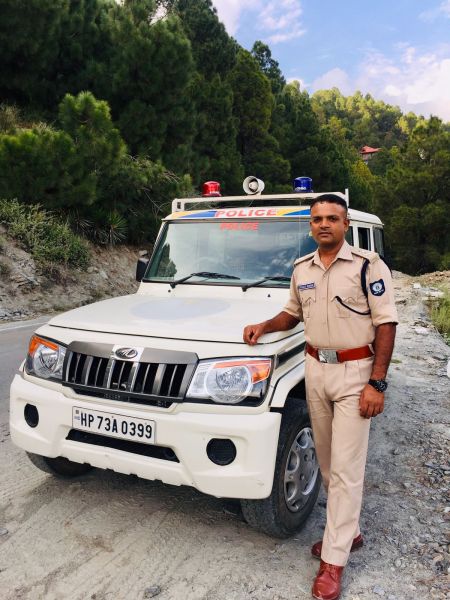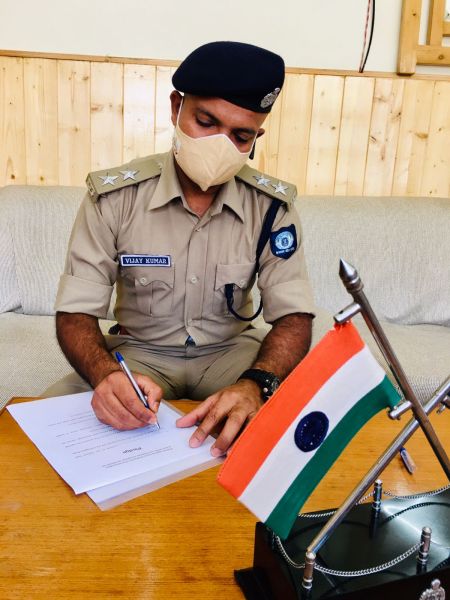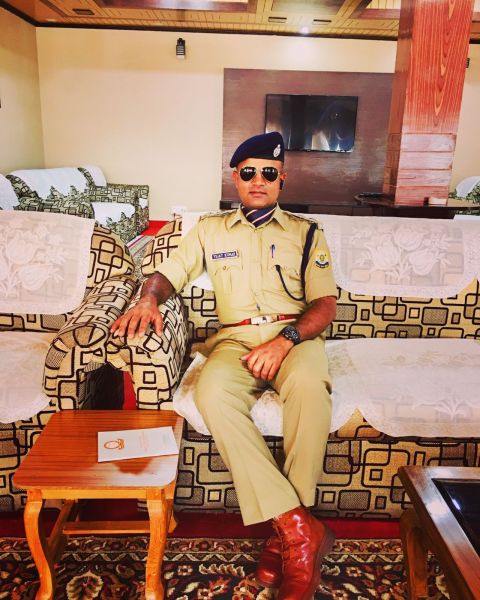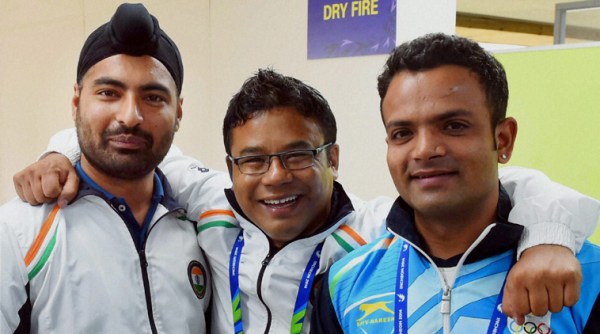There’s this silver medal that 2012 London Olympics silver medallist Vijay Kumar recently won, which he takes great pains to undermine. It was at an All-India inter-Police meet.
“Others must not have shot too well,” he says, shooting straight as an arrow.
“Actually, the department insisted because I was a shooter. So, I entered reluctantly and wasn’t expecting any medal.”
“Qualification score was theek-thaak (ok).”
Comme ci, comme ca.
Vijay Kumar during a practice session.
Vijay tempers all expectations of a fairytale comeback at the upcoming World Championships in Cairo, saying it’s still too early into his return to hit the high notes of performance. The Paris Olympics, though, is firmly in his sights. And returning to the Indian team, four years exactly since the 2018 Changwon Worlds where he last participated, Vijay says he’s happy triggering in the super-speedy, quick-reflexed 25m Rapid Fire event. Happy yes, haughty, not quite.
“I only qualified as No. 3 in ranking in India. Scores weren’t too high,” he issues a disclaimer, reminding again of only a gradual build-up, and the lower echelons he’s fiddling and clambering about.
Ten years since he won a silver at London, in an eye-popping Rapid Fire final that finished with no European on the podium, Vijay says he’s not too fussed about the changed format of competition (8-man final now instead of 6). “The last format change (hit-or-miss, 9.7 or above was Hit, anything less a Miss) was also changed right before the London Games. Now there’s a new format (back to 8 in final + semifinal duels), so it’s the third rule change in my career. I’m ok with it. I’m always OK,” he chuckles.
So, was shooting forgotten in the years he had disappeared since 2018? “I was never gone from the sport. But wasn’t good enough to qualify (for top events),” Vijay says candidly.
Completing his 16-year tenure in the Army by 2017, he would switch to civil forces, and be appointed DSP in Himachal Police. “I hadn’t qualified for the Olympics so I thought I might as well complete my service training. It was a good time to start, and the right choice. Then after 2019, the pandemic happened, and it helped because I could train systematically without the pressure of a major competition.”
 Shooter Vijay Kumar joined Himachal Pradesh Police as DSP.
Shooter Vijay Kumar joined Himachal Pradesh Police as DSP.
He’d pick a silver at the inter-Police tournament without training, feel inadequate about his preps, and declare the silver a matte, rather than a shining indication of an Olympic medallist’s glorious return in one of India’s most sentimentally-followed sport. Yet, since London 2012, it has been a barren two Games for Indian shooters – pointing to the Olympics being a different kettle of fish, needing another level of preparation.
“I was rooting for an Indian to qualify at the 2019 Asians for Tokyo. But we couldn’t get the quota, sadly. You have to master control of the weapon at crucial stages. We are all learning, let’s see if we will be there in 2024,” he says.
But jumping into the Worlds – the same competition he went to last, gets Vijay excited and nervous at same time. He would miss shooting on days while completing his training, but mostly he was getting on with his new life. “It was 15-16 years of my life, so obviously I’d miss it. I’m always happy at a competition range. That’s the only place you learn and can catch mistakes which you never will in training,” says the 37-year-old from Hamirpur.
Back on the bike
Vijay reckons if one is out of long-term training, but the mental status is good and willpower strong, it takes only a few days to start retrieving the old feel around the grip. Meanwhile, a day job beckoned.
“I reached the rank I could after 16 years and auto-retired in 2017. It took two years for the police file to get processed, and by November 2018 clearance was complete. It was a significant shift though both are services, one civil. This involved a lot of academic stuff – case files, investigations, court proceedings, tackling detection tools,” he explains. Bandobast (arrangement), traffic and court sittings – the days rolled by.
 Vijay Kumar at his HP Police office.
Vijay Kumar at his HP Police office.
Policing involves more public dealings, and books. “I was ok at studies. Never failed any class in school. But in the early days of training, yes, it was tough to concentrate,” he says. Those heady moments of Olympic podiums and felicitations and the athlete’s typical bubble life became a distant memory.
India, meanwhile, floundered from one Olympic to the next – a medal-less nightmare that 2024 is expected to end. Armyman Gurpreet Singh narrowly missed the Rio final – finishing 7th in Rapid fire. But given no one could nail the RF quota for Tokyo, Gurpreet’s near-miss hurts even more.
For Vijay, December 2021 was when the itch to compete in the big league got too much. “A circular came in late 2021, and I sent an application saying I wanted to participate. It was approved,” he says, sounding happy to return. He’d start with a week’s training, retracing his steps.
“There’re 4-5 pointers to follow which can get you a respectable score. Body stability, smooth grip, continuity of movement, challenge per shot, per series. It takes time to regain the steadiness though,” he says.
Vijay’s London silver was special, because only 8 of 57 Olympic medallists since WW2 in Rapid Fire have been non-Europeans. It’s a staggering 85 percent from Europe in what is considered sport shooting’s fastest, quick-reflexed event on the range. It’s accuracy yes, but accuracy on acceleration, as RF (Rapid Fire) shooters aim at five lined-up targets in a series shot over 8 seconds, 6 seconds and the toughest – 4 seconds. It’s fairly fun to watch, but has always demanded slightly supehuman reflexes on the hand-eye coordination metric, as they go thak thak thak thak thak along a horizontal axis, while aiming to go better than 9.7. Vijay’s silver back in 2012 came from a special speed skill, besides enormous preparation.
 For Vijay, December 2021 was when the itch to compete in the big league got too much.
For Vijay, December 2021 was when the itch to compete in the big league got too much. There’s no age bar in rapid fire, though Vijay – after getting over a slight affront he feels when asked about slowing instincts with age – insists: “My shooting reaction speed is still good. I’m using the old technique and feeling the same speed as before.”
Cuban Leuris Pupo won the Tokyo silver at age 44 in Rapid Fire. He had been the surprise Olympic champion in London, winning gold ahead of Vijay in 2012, while beating back the rehearsed perfection and mad accuracy of Russian Alexei Klimov, who shot a record score in qualification. That was his 4th Olympics, after starting at Sydney 2000. Pupo would win silver in Tokyo 21 years after his first Games, and Vijay reckons he can get himself a second shot too.
Tough competition
Rapid fire with legends such as triple Olympic champion Ralf Schumann, and later Christian Reitz (gold at Rio, bronze at Beijing), is currently under the spell of gap-toothed French magnifique marksman, Jean Quiquampoix (pr: Ki-kaam-puaa) – silver at Rio and gold at Tokyo. Paris will be another chapter for the mid-20s man shooting at home, though there’s always a bunch of Chinese tapping away for contention.
Vijay’s silver was significant also because despite dominating Rapid fire at World Championships, the Chinese have never managed to better their bronze position in the last three Olympics. The Germans and Russians are rather formidable in this event, and only six Asians have ever medalled in RF.
 Silver medalist from left to right Vijay Kumar , Tamang Pemba,Gurpreet Singh in men’s 25m Center pistol event at the Ongnyeon International Shooting Range (Source: PTI)
Silver medalist from left to right Vijay Kumar , Tamang Pemba,Gurpreet Singh in men’s 25m Center pistol event at the Ongnyeon International Shooting Range (Source: PTI)
Preps have pushed Vijay back into “hostel life”, where he slums it out in a dorm-like environment, staying away from family, and focused on very extreme physical training, seeking technical perfection over long hours spent retrieving his zone with hardcore simulations. “It’s hard to return to that hostel life. But I don’t crib. Never did in the army, won’t now. This is what we chose. A medal needs this. All medallists prepare like this,” he says simply.
Vijay’s neck was in bad shape back in 2014 owing to the sheer imbalance of the stance, and his back wrecked pretty much which felt like syntax errors of the spine – a badge of honour of all shooting medallists. “It was operated upon in 2014 and fixed after 6 months’ rehab. I feel stronger than before on the 8/6/4 and now with 8 shooters in the final, it should be interesting. Neck’s totally ok,” he states.
Yet, this isn’t the return of the creaking Terminator to shooting Pro. His personality, much like the level-headed realism of the other three Indian Olympic medallist shooters (Rajyavardhan Rathore, Abhinav Bindra, Gagan Narang), eschews all such flourish. Vijay laughs away those images, though Indian shooting could do with a sprinkling of a sensational return of any of its four medalling musketeers come Paris – such has been its inexplicable horror run chasing an elusive medal from Rio to Tokyo.
How did his fellow shooters react on seeing him back? “A few were shocked, few were jealous. But many were happy,” he chortles.
Hopes will always rest on the young bunch with their prodigious talent and fearless ways. Yet, here’s a shooter who went to one Olympics, brought one silver, and is under no illusion that a medal will simply conjure out of a target. The Rapid Fire is shooting’s only surviving event from 1896. Vijay Kumar knows the old ways of pickled-in-perfection preparation. He doesn’t promise a medal, but will try his best.





